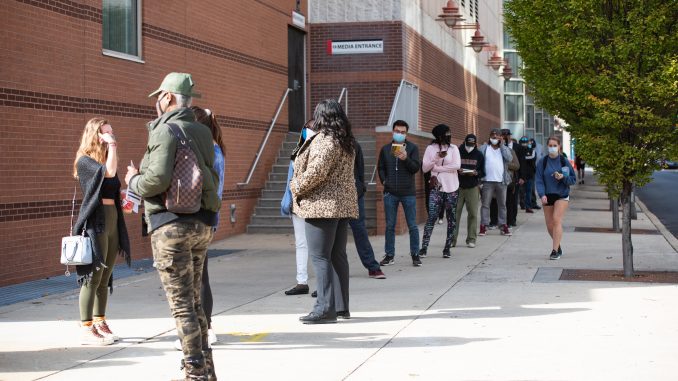
With the general election underway today, students are weighing problems they hope to see the winner of the election address, like climate change, student loans and immigration.
Voter turnout among college students in the United States increased from 45.1 percent to 48.3 percent between the 2012 and 2016 presidential elections, according to a 2017 study by Tufts University.
“There is a great deal of untapped power that college students have in elections,” said Kevin Arceneaux, a political science professor. “College students, as a group, and young adults more generally, have been much less likely to vote in previous presidential elections.”
Eighteen- to 29-year-olds are the age group least likely to vote, said Robin Kolodny, chair of the political science department. If young people want candidates to speak more on student loan debt and free public college, they have to vote as much as people over 60 years old.
As of Sunday afternoon, 93 million early ballots have been cast, leaving voter turnout for the 2020 election on track for historic levels, NPR reported.
Eligible voter turnout could be as high as 67 percent, the highest turnout since 1908, USA Today reported.
More than seven million voters between 18- and 29-years-old voted by the end of October, including 226,900 early ballots cast and 468,400 ballots requested in Pennsylvania by Oct. 27, according to the Center for Information and Research on Civic Learning and Engagement.
Sunday’s early ballot count is almost two times the amount of pre-election votes cast in the 2016 election, according to the turnout-tracking database U.S. Elections Project.
“It isn’t that younger voters won’t respond to information about the election, it’s just that you guys are three times harder to find,” Kolodny added. “If you’re young or you’re poor, you move all the time, and every move is a new registration.”
Jules Henson, a junior neuroscience major, said climate change action, higher minimum wage and student loan forgiveness are just a few of the issues that need to be addressed by the winner of the election.
“I’m voting for Biden,” Henson said. “I just don’t know if he’s gonna be able to do it. I think it’s gonna be very difficult for him to fix these issues. Some changes are going to have to be gradual. I don’t think there’s any one president who will make changes that are significant enough.”
Former Vice President Joe Biden’s platform calls for free public college for families with an income below $125,000 and no accrued interest on undergraduate federal student loans for individuals making less than $25,000, according to Biden’s campaign website.
President Donald Trump does not support free public college, but he wants to replace the multiple income-driven loan repayment plans with a single plan and give undergraduate borrowers student loan forgiveness in 15 years instead of 20, Forbes reported.
More than seven in 10 college students say they are following news about the election, with only one-quarter of students tracking the election closely, according to a September study by College Pulse and the Knight Foundation.
“I think that, basically, anyone will address these issues better than Trump,” said Maya Inglis, a second-year law student. “My top issues are immigration and the environment, so I’m voting for Biden. He’s not even one of my top choices, but I’ll take anyone else at this point.”
While Biden is favored among college students, 49 percent of students have a favorable impression of Biden, while 51 percent have negative views, College Pulse and the Knight Foundation further reported. Less than one in five students have a favorable view of Trump.
“For me, the top election issues are social injustice, climate change and social welfare,” said Ismail Baram, a senior statistics major. “That’s why I’m voting for Biden, because I believe that he will contribute to that more than Trump.”
Joe Orsatti, a senior business management major, isn’t fond of either candidate but plans to vote for Biden, he said.
“At the very least, I believe Biden will defer to his advisors, especially [Kamala] Harris, for many of the big decisions and could help stop the bleeding to some extent by helping to restimulate the economy, as he did alongside [Barack] Obama in [2008], without sustaining the current environment that encourages racism,” Orsatti said.
Orsatti never thought he would vote, but he’s happy to do it if it’ll get Trump out of office, he said.
“I lost two jobs because of this pandemic, and I blame Trump,” he added. “He knew about it in January and didn’t take action.”
Lindsay Walsh, a junior public health major, believes the U.S. is a nation of different views where all should be respected, she said.
“Trump is a businessman, a man of his word,” she said. “He isn’t here to make everyone feel great. He was elected for change and to get the job done. Trump signed the First Step Act, which reduces mandatory minimum sentences for drug felonies and expanding early release programs.”



Be the first to comment